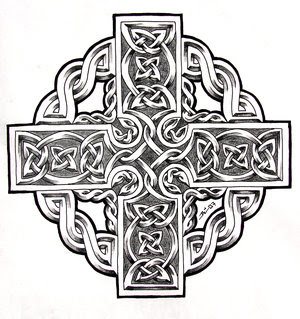Celtic Cross Tattoo Design Picture 1
Tattoo Center. Celtic Cross Tattoo Designs. The cross image is carved in many beautiful and creative designs and patterns. Colors are also used to make them attractive and elegant. One such creative cross pattern can be seen in Celtic cross tattoos. The Celtic symbols are also believed to possess mysterious power and energy. A combination of both doubles up the spiritual aura hidden inside them. This is why the Celtic cross tattoos are such sought-after fashion accessories. People with a religious bent of mind go gaga over them.
Celtic Cross Tattoo Design Picture 2
The Celtic Cross, sometimes also known as the Wheel Cross or the Ring Cross, began to appear in Europe during the Middle Ages, beginning as early as the 5th century. Although today in tattoo designs it is typically an ornate symbol of Christianity, it likely derived from much earlier pagan symbols. In fact, these simple pagan images were probably associated with fertility the cross, or more literally a simple "plus sign", standing for the male generative power and the circle for the female. Also linked with fertility in agriculture, these two symbols sometimes stood for the sun.
Celtic Cross Tattoo Design Picture 3
Early on however, as Christianity began to spread throughout Europe, the plus sign was elongated into a cross and the symbol was adopted and placed in churches and graveyards. In Scandinavian countries, it was erected in locations where accidents or acts of violence had occurred and it was also used in front of farmhouses. Today its more common use is in the form of gravestones in, for example, Ireland, where the Celtic association is strongest. Most often in tattoo designs, the Celtic Cross is treated with the most famous of the art motifs associated with that region, intricate knotwork.

Celtic Cross Tattoo Design Picture 4
Knotwork is a constant theme in Celtic art, especially in Irish manuscript illumination. The fantastic illuminated books that have survived for us today began to be produced in the Celtic west sometime after about 500 AD. Religion managed to survive the Middle Ages in monasteries, where artist monks labored to produce the lavishly illustrated Christian manuscripts known today as the Book of Kells, the Lindisfarne Gospels, or the Book of Durrow, as a few examples. In fact, much of Celtic tattoo art is modeled on ornamentation from these manuscripts and the Celtic Cross is no exception.
No comments:
Post a Comment
Note: Only a member of this blog may post a comment.